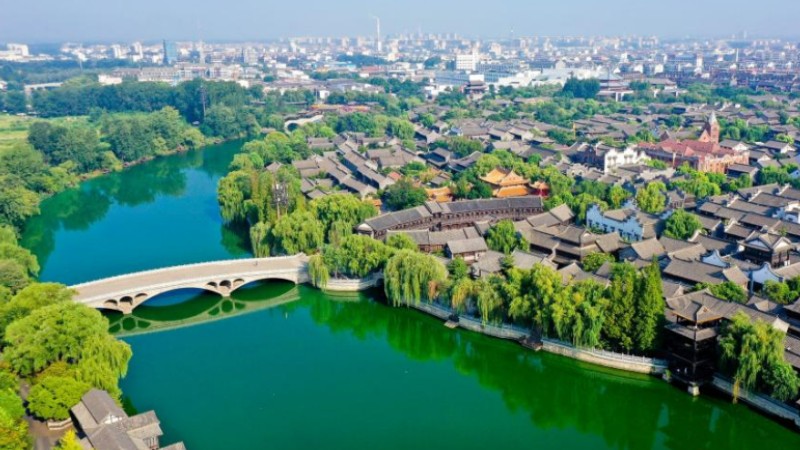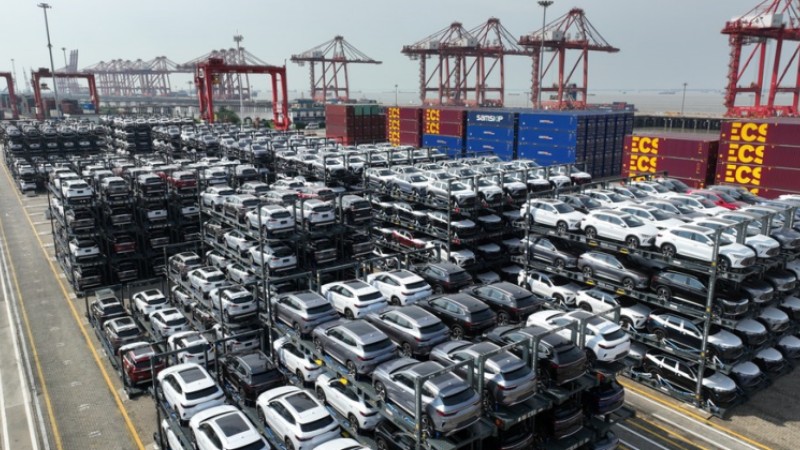Low-carbon goals gaining prominence
Xi's philosophy on ecological civilization drives comprehensive transformation
In Hongfan village in Xiaogan, Hubei province, solar panels cover the roofs of houses; an electric vehicle charging station is operational at the entrance of the village committee's office; and solar lights dot the roads. In short, green power is making Hongfan a "zero-carbon" village.
What the small village has achieved is part of China's big efforts to reduce carbon emissions. The country is striving to meet its strategic goal of reaching carbon peak and becoming carbon neutral while advancing the building of an ecological civilization — a concept that Xi Jinping, general secretary of the Communist Party of China Central Committee, proposed for a balanced and sustainable development that features harmonious coexistence between man and nature.
Tuesday marks the country's first National Ecology Day, a special day designated by the National People's Congress, China's top legislature, to advocate an ecological civilization. Guided by Xi's philosophy on ecological civilization, China has given greater prominence to green and low-carbon development since the 18th CPC National Congress in 2012, and the intensity of carbon dioxide emissions has continued to decrease.
China's consistent actions in carbon reduction are coupled with international efforts to address the challenges arising from climate change, as the warming climate increases the likelihood of extreme climate events such as wildfires, typhoons, floods and droughts. Climate-related disasters have had a huge influence on the global economy and security.
In September 2020, Xi, who is also Chinese president, announced that China would strive to reach carbon peak before 2030 and achieve carbon neutrality before 2060, which is described as the country's "dual carbon" goal. He emphasized that achieving such a strategic goal "is not something that others ask us to do, but something we must do ourselves".
During his inspection tours nationwide, Xi has emphasized time and again that adhering to green development is the only way forward. He has urged achieving new breakthroughs in order to advance comprehensive green transformation.
Zhu Liyang, president of the China Association of Circular Economy, said the work on "dual carbon "goal is not just a climate issue, but also a question of the way the country's economy and society develop.
"General Secretary Xi Jinping's decision to include the achieving of the 'dual carbon' goal in the overall structure of ecological civilization helps to promote a comprehensive and in-depth systematic green transformation of our country in terms of development mode, industrial structure, energy structure and public awareness," Zhu said.
A wide-ranging and profound transformation of the economic and social systems is accelerating around the "dual carbon" goal. A series of approaches in terms of green and low-carbon production and lifestyle are being practiced at an accelerated pace in China.
Optimizing its energy structure is one of China's major steps toward meeting its carbon reduction goal. Over the past decade, the country has secured an average annual economic growth rate of 6.2 percent and an average annual energy consumption growth rate of 3 percent, making it one of the countries with the fastest reduction in energy consumption intensity.
In 2022, China's installed capacity for renewable energy reached more than 1.2 billion kilowatts, exceeding that of coal power for the first time and accounting for 47.3 percent of the country's total installed capacity.
China's installed capacities for hydroelectric power, wind power and solar power have all exceeded 300 million kW, ranking first in the world for several consecutive years. The electricity generated from renewable energy is equivalent to the reduction of approximately 2.26 billion tons of domestic carbon dioxide emissions.
Zhao Xiaolu, senior director of the Climate Environmental Defense Fund's Beijing Representative Office, said that China has taken positive measures to increase its installed capacity of renewable energy. "We see the Chinese government and industry are making a lot of progress. For example, China has built the largest carbon market in the world and is improving it. ... By doing that, China can reduce greenhouse emissions at a faster pace and lower cost."
On July 11, while presiding over a meeting of the Central Commission for Comprehensively Deepening Reform, Xi said, "We must base ourselves on the key period when China's ecological civilization construction has shifted its focus to carbon reduction."
He called for improving the control of the amount and intensity of energy consumption, and gradually transitioning to the control of carbon emissions in terms of total quantity and intensity.
Djoomart Otorbaev, a former prime minister of Kyrgyzstan and distinguished professor of the Belt and Road School of Beijing Normal University, said that over the past few years, China has played a crucial role in combating climate change worldwide by reducing its own carbon footprint, protecting biodiversity and fostering green transformation.
In an article published by China Global Television Network website, Otorbaev said it would be practical if the concept of "ecological civilization" expanded its influence and started by influencing Asia, as the region has significant potential in overcoming the challenges of climate risk management.
He underlined the need for countries to coordinate their efforts to meet environmental and developmental objectives, and commended China's role in promoting global climate governance.
By the end of 2022, China had signed 54 multilateral treaties on global environmental governance and 115 bilateral treaties.
Photos
Related Stories
- Xi Focus: Xi's inspection trips show key points of China's high-quality development
- Xi's longstanding friendship with the youth
- Xi's Quotes | We are devoted to each other like the jade jar reflecting a cold moon
- Xi's remarks on mass fitness, sports
- Diplomacy on climate spurs unity, actions
- Xi leads way in combating Beijing, Hebei floods
- Xiong'an trip impresses Xi's Iowa friends
- Xi's selected works issued in 7 ethnic languages
- Xi Jinping's selected works published in 7 ethnic minority languages
- President calls for all-out search and rescue efforts
Copyright © 2023 People's Daily Online. All Rights Reserved.









